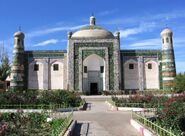No edit summary Tag: sourceedit |
No edit summary Tag: rte-wysiwyg |
||
| Line 43: | Line 43: | ||
[[Category:Age of Empires III]] |
[[Category:Age of Empires III]] |
||
[[Category:Native Asian Civilizations]] |
[[Category:Native Asian Civilizations]] |
||
| − | [[Category:Indian]] |
||
| − | [[Category:Minor civilizations]] |
||
Revision as of 16:38, 31 January 2017
Template:Infobox Civ The Sufi Mosque is present as Trading Post sites in the Age of Empires III: The Asian Dynasties expansion.
The word "Sufi" first appeared in the 8th century and is considered to be a reference to the coarse wool garments worn by spiritual men who sought lives of spiritual harmony, free from bodily pleasure and in harmony with nature. Sufism became a sect of Islam in its own right and continues to practice in the modern day.
Unit

War Elephant
The Sufi provide the War Elephant, which on its own is the most powerful native unit in Age of Empires III (It is like a weaker version of the Mahout Lancer), possessing a very high health and a high melee attack, making it powerful Heavy Cavalry, although its resistance is weak. However, because of the low build limit of six per tribe, the use of the elephant is limited. In fact, it has the lowest build limit among the standard native soldiers, superseded only by the Medicine Man of the Maya, the Cree Coureur des Bois, and the Nootka War Chief. It is suggested to use the elephants only as support, as they are expensive, and could easily fall prey to heavy infantry if not covered.
Upgrades
Pilgrimage: Price: 100 food, 100 wood. Ships 1 fattened goat for every 2 minutes of the game that has passed, up to 30 minutes.
Fasting Price: 100 food, 100 coin. Increases all villager rates, while giving them lower hit points.
Sharia Price: 225 food, 225 coin. Increases villager limit by 10%.
Tactics
In general, the Sufi is one of the better tribes to ally with, giving their powerful economic upgrades. Their units is of limited use, but especially the Sharia improvement is good, namely for the Dutch, the French and the Japanese, due to their lower villager limits. One should take note, that when taking the Fasting improvement, villagers are quickly killed if attacked, making them more vulnerable. Therefore, with this upgrade, the villagers should be kept safe.
History
| “ | This Holy Site is identical to a Native Trade Site. Allying with Natives allows a player to train special Native units, usually warriors, and also grants access to a group of improvements to that tribe. Native units do not cost any population spaces, but can only be built in limited numbers. The word “sufi” first appeared in the 8th century and is considered to be a reference to the coarse wool garments worn by spiritual men who sought lives of spiritual harmony, free from bodily pleasure and in harmony with nature. The word “sufism” was first used in the 9th century, and became a blanket term for a variety of different forms of Islamic mysticism incorporating such disparate elements as Christian monasticism, gnosticism, and Indian mysticism. Because Sufism encompasses a number of belief systems, its origins can be linked to a wide range of geographic regions and periods. However, many consider Sufism to have begun with the practice of Shiite Muslims in the 7th century in what is now Iraq, although others claim that Sufism predates Islam and simply used the other religion as a vehicle for its teachings. Throughout its long history, Sufism has been criticized for its mystical elements. While it has made significant contributions to the spread of Islam and the development of Islamic culture, conservative Muslims still disagree with its abundance of non-Islamic customs. | ” |
Gallery
Template:Civilizations (AoE3)

